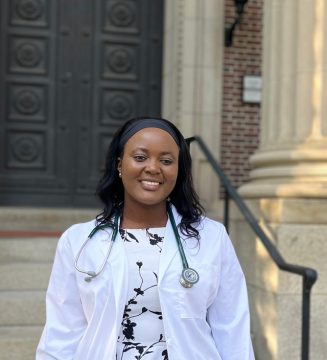Fatima Madondo ’26 is among 10 medical students nationwide awarded an Association of Radiation Oncologists (ASTRO) Medical Student Fellowship that introduces students from underrepresented populations to radiation oncology and supports a summer research project.
“Before starting medical school, I had never heard about radiation oncology,” Madondo says. “During a dinner for international students, I met Dr. Bassem Zaki, one of the speakers at the dinner who was a radiation oncologist. I became curious and wanted to learn more about the field.”

While taking advantage of an opportunity to shadow Zaki, Madondo was fascinated by the work that he and his team were doing in targeting tumors “with the right dosage at the right location to reduce radiation side effects.” It was then that she learned about the ASTRO fellowship. “I saw this as an opportunity to engage in research and connect with radiation oncologists from around the country and students who are interested in learning about radiation oncology.”
Thanks to the fellowship award, Madondo is conducting research with Kelli Pointer, MD, PhD, assistant professor of medicine, in her lab at Dartmouth Hitchcock Medical Center this summer.
“The aim of my research is to determine whether hERG—genes that encodes for a potassium ion channel that was demonstrated to be upregulated in glioblastomas—inhibition can be used for radiation sensitization. Completion of this aim will provide insight into whether hERG blockade can be used for radiation sensitization in hopes of providing more treatment options for patients diagnosed with glioblastomas—grave IV astrocytoma and most malignant primary brain tumor.”
Founded in 1958, ASTRO’s mission is to advance the practice of radiation oncology by promoting excellence in patient care, providing opportunities for educational and professional development, promoting research, and disseminating research results and representing radiation oncology in a rapidly evolving health care environment.
ASTRO is dedicated to improving patient care through professional education and training, support for clinical practice and health policy standards, advancement of science and research and advocacy.